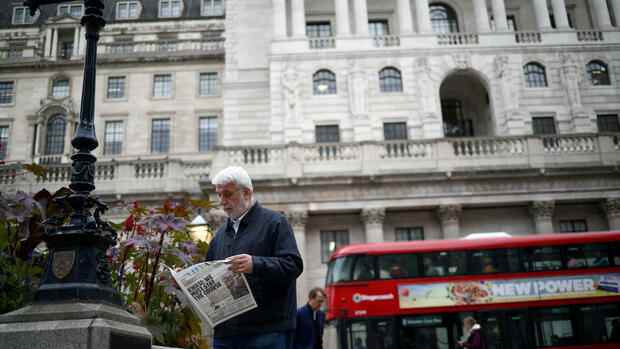To reassure investors, the British central bank had only announced the purchase of inflation-linked securities on Tuesday.
(Photo: Reuters)
Frankfurt The British central bank has countered speculation about a longer crisis in the bond market. This caused unrest on the market for British government securities on Wednesday. The Bank of England (BoE) denied a Financial Times report that it had signaled it was ready to extend its emergency bond-buying programme.
The temporary bond purchases would “end on October 14,” a Bank of England spokesman said. This attitude was made “absolutely clear” at the highest level in contact with the banks.
The yield on 30-year debt instruments then rose significantly – and was again above the five percent mark. It thus reached its highs from the end of September.
Back then, British Prime Minister Liz Truss and Treasury Secretary Kwasi Kwarteng caused panic with their plans for massive debt-financed tax cuts. Investors doubt that the British state can finance them. A short time later, Truss and her Treasury Secretary withdrew some of the relief. In addition, the Bank of England announced temporary bond purchases to calm the situation. However, this only worked for a short time.
Top jobs of the day
Find the best jobs now and
be notified by email.
Holger Schmieding, chief economist at Berenberg Bank in London, emphasizes: “The bond markets are extremely nervous.” He assumes that the Bank of England can calm things down again and again and prevent a financial crisis. But the crisis of confidence will probably lead to significantly higher interest rates.
On Tuesday, the British central bank announced that it would buy inflation-linked securities. These are usually held by pension funds. BoE chief Bailey signaled on Tuesday that these funds and other investors have only this week to sort out their problems. “We have communicated that we want to get out by the end of the week. We think the rebalancing has to be.”
Investors fear a premature end
Yields on inflation-linked bonds also rose on Wednesday after the central bank put its foot down. There is concern among investors that the end of emergency measures may come too soon for some pension funds.
Experts doubt whether the problems can be solved without further steps. The US economist Mohamed El-Erian said in an interview that from his point of view there is no alternative to completely reversing the planned tax cuts. According to calculations by the think tank Institute for Fiscal Studies (IFS), even if part of the relief is forgone, it would still tear a £60 billion hole in the budget by 2026.
Berenberg chief economist Schmieding also demands that the government “must present a credible plan, calculated by the independent Office of Budget Responsibility, as quickly as possible on how it wants to get public finances under control again”. From his point of view, further cuts in the planned tax cuts would make sense.
More: There is an acute risk of a crisis on the financial markets – one comment.
